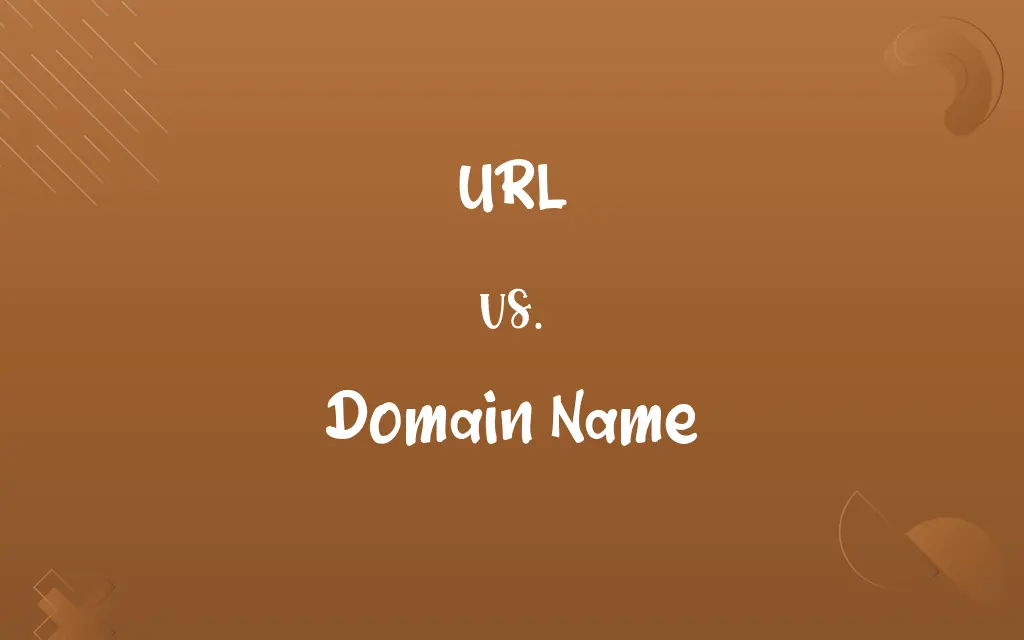URL vs. Domain Name: Know the Difference

By Hifza Nasir & Shumaila Saeed || Published on March 2, 2024
A URL specifies an exact location on the web, including protocol and path, while a domain name identifies a specific website's address within the DNS.

Key Differences
A URL (Uniform Resource Locator) provides a complete address to access a specific resource on the Internet, including the protocol (like HTTP or HTTPS), domain name, and often a path to a specific file or page. A domain name, however, is a part of a URL that identifies a unique website's address on the Internet, translated from an IP address via DNS (Domain Name System) for easier human understanding.
Shumaila Saeed
Mar 02, 2024
A domain name serves as a memorable address for a website, acting as an entry point to the site's content, a URL goes further by specifying the exact location of a resource within that website, which can include a specific page, image, or file.
Shumaila Saeed
Mar 02, 2024
Domain names are hierarchical, with top-level domains (TLDs) such as .com, .org, or country codes like .uk, .us, and second-level domains that are chosen by the website owner, like example in example.com. URLs encompass this structure and extend it with additional information like the protocol (HTTP/HTTPS), subdomains (like www), and paths to specific resources.
Hifza Nasir
Mar 02, 2024
The DNS is integral to translating domain names into IP addresses that computers use to communicate, while URLs are utilized by web browsers to retrieve specific content from the web servers associated with those IP addresses.
Hifza Nasir
Mar 02, 2024
Understanding the distinction is crucial for web navigation and development, as domain names provide a foundation for a website's identity and accessibility, whereas URLs facilitate precise access to the vast array of individual resources available online.
Hifza Nasir
Mar 02, 2024
ADVERTISEMENT
Comparison Chart
Definition
A complete web address specifying the location of a resource on the Internet
A part of a URL identifying a website's address within the DNS
Shumaila Saeed
Mar 02, 2024
Components
Protocol, domain name, path, and possibly a query string and fragment
Second-level domain and top-level domain (TLD)
Hifza Nasir
Mar 02, 2024
Function
Directs to a specific resource like a webpage, image, or download file
Serves as a memorable address for accessing a website
Hifza Nasir
Mar 02, 2024
Example
Https://www.example.com/products/item1 specifies a protocol, domain, and path to a product
Example.com represents the website's address
Dua Fatima
Mar 02, 2024
Relies On
DNS for domain name resolution, web servers for hosting the resources
DNS to translate to IP addresses for web communication
Hifza Nasir
Mar 02, 2024
ADVERTISEMENT
URL and Domain Name Definitions
URL
A URL can contain a path to a specific file or page within a website.
/page.html in https://site.com/page.html
Dua Fatima
Feb 26, 2024
Domain Name
Subdomains can be used to organize or navigate different sections.
Blog.example.com
Shumaila Saeed
Feb 26, 2024
URL
Fragments in URLs specify a part of a page.
#section1 in https://example.com/page#section1
Shumaila Saeed
Feb 26, 2024
Domain Name
It consists of a second-level domain and a top-level domain (TLD).
Example (SLD) and .com (TLD)
Shumaila Saeed
Feb 26, 2024
URL
A URL is the full web address used to access a specific resource online.
Https://www.example.com/about
Shumaila Saeed
Feb 26, 2024
ADVERTISEMENT
Domain Name
Country code TLDs indicate a website's country association.
.uk, .ca, .au
Shumaila Saeed
Feb 26, 2024
URL
It includes a protocol indicating how the resource should be accessed.
HTTP or HTTPS in http://example.com
Hifza Nasir
Feb 26, 2024
Domain Name
Domain names are translated into IP addresses by DNS.
Example.com might translate to 192.0.2.1
Hifza Nasir
Feb 26, 2024
URL
URLs may include a query string for passing data to web applications.
?search=query in https://example.com/search?query=keyword
Hifza Nasir
Feb 26, 2024
Domain Name
A domain name is the human-readable address of a website on the Internet.
Example.com
Hifza Nasir
Feb 26, 2024
URL
An internet address (for example, http://www.hmhco.com/about-hmh), usually consisting of the access protocol (http), the domain name (hmhco.com), and optionally the path to a file or resource residing on the server where the domain name resides (about-hmh).
Hifza Nasir
Jan 25, 2024
Repeatedly Asked Queries
What role does DNS play in using domain names?
DNS translates human-readable domain names into IP addresses, enabling browsers to establish connections with the corresponding web servers.
Hifza Nasir
Mar 02, 2024
What is a URL?
A URL is a comprehensive web address that directs to a specific resource on the Internet, including protocol, domain name, and path.
Shumaila Saeed
Mar 02, 2024
Can a domain name change its associated IP address?
Yes, the IP address associated with a domain name can change, especially with dynamic DNS services or when changing hosting providers.
Hifza Nasir
Mar 02, 2024
Why might a URL include a query string or fragment?
Query strings pass data to applications, while fragments direct to specific sections of a page for enhanced user navigation.
Hifza Nasir
Mar 02, 2024
Are domain names case-sensitive?
No, domain names are not case-sensitive, though paths and filenames in URLs might be, depending on the server.
Dua Fatima
Mar 02, 2024
Can two different URLs lead to the same resource?
Yes, through redirects, aliases, or different paths serving the same content, multiple URLs can access the same resource.
Hifza Nasir
Mar 02, 2024
Can a URL exist without a domain name?
Typically, URLs include a domain name to specify the website, but in local networks or specific contexts, IP addresses or local hostnames might be used instead.
Shumaila Saeed
Mar 02, 2024
How does a domain name work?
A domain name provides a readable address for a website, which is translated into an IP address by DNS for web communication.
Hifza Nasir
Mar 02, 2024
Why are URLs important?
URLs are crucial for locating and accessing specific resources on the web, from web pages to downloadable files.
Hifza Nasir
Mar 02, 2024
How are domain names structured?
Domain names consist of a second-level domain (SLD) and a top-level domain (TLD), with optional subdomains for additional organization.
Shumaila Saeed
Mar 02, 2024
How does a URL indicate a specific page or file on a website?
The path component of a URL specifies the exact location of a resource within the website's structure.
Hifza Nasir
Mar 02, 2024
What's the difference between HTTP and HTTPS in URLs?
HTTP is the standard protocol for transferring data, while HTTPS includes security measures (SSL/TLS) for encrypted communication.
Dua Fatima
Mar 02, 2024
What is the significance of top-level domains (TLDs)?
TLDs help categorize domain names by type or geographic location, such as .com for commercial entities or .uk for the United Kingdom.
Hifza Nasir
Mar 02, 2024
What happens if a URL's domain name doesn't exist?
If a domain name in a URL doesn't exist or cannot be resolved, the browser typically displays a DNS error or "not found" message.
Dua Fatima
Mar 02, 2024
How can I obtain a domain name?
Domain names are registered through domain registrars, where you can choose and purchase available names.
Hifza Nasir
Mar 02, 2024
Share this page
Link for your blog / website
HTML
Link to share via messenger
About Author
Written by
Hifza NasirCo-written by
Shumaila SaeedShumaila Saeed, an expert content creator with 6 years of experience, specializes in distilling complex topics into easily digestible comparisons, shining a light on the nuances that both inform and educate readers with clarity and accuracy.







































































